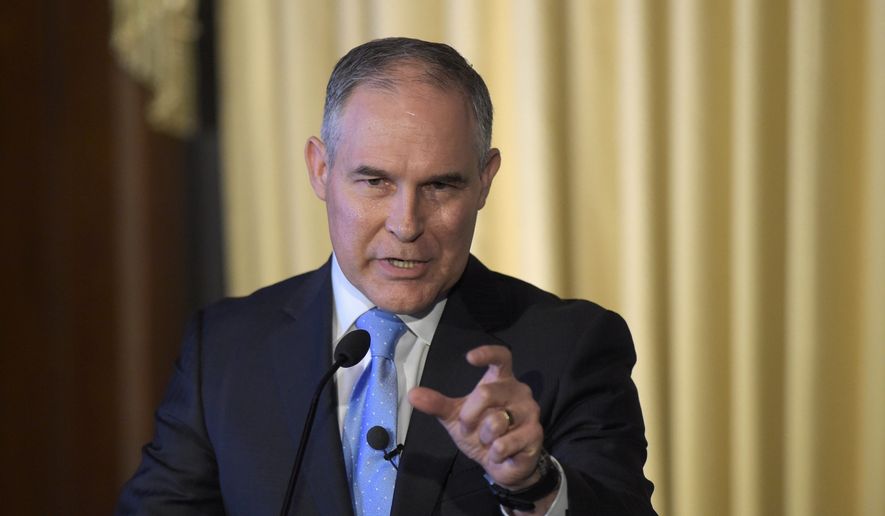President Trump’s proposed cuts to the Environmental Protection Agency would take it back to the staffing levels it had under President Reagan and to a budget it outgrew in 1990, marking what would be the most dramatic rollback in the agency’s 47-year history.
While the White House’s budget blueprint isn’t likely to survive as written, the plan underscores how Mr. Trump and EPA Administrator Scott Pruitt are bent on reeling the agency back in and shrinking its footprint across the regulatory spectrum. They aim to achieve those goals through harsh cuts to the agency budget — slashing it by $2.6 billion — and the EPA workforce, calling for a reduction of 3,200 employees.
“The budget for EPA reflects the president’s priority to ease the burden of unnecessary federal regulations that impose significant costs for workers and consumers without justifiable environmental benefits,” the White House said in its proposal.
The $5.7 billion proposed budget would be the agency’s lowest since 1990. The EPA workforce would shrink to its lowest total since the mid-1980s under the plan, which also calls for a near total elimination of the agency’s efforts to fight climate change.
The scaled back EPA, analysts say, would be far less intrusive and would give states greater leeway in a host of areas. On the flip side, the agency would abandon much of its work on scientific research, restoration projects at the Great Lakes and Chesapeake Bay, hazardous waste cleanup projects, energy efficiency programs and in other areas.
“The budget expressly intends to give EPA a secondary role in supporting state and tribal environmental protection efforts rather than the primary role it has played for the last 40 years,” said James Rubin, an attorney at the Dorsey & Whitney law firm who formerly worked in the Justice Department’s Environmental and Natural Resources Division. “It is unclear whether even the Republican House and Senate have appetites for such wholesale changes in focus and responsibility, but the administration has certainly presented its vision of a far more limited federal agency.”
The EPA also would cede much of its enforcement authority to states. The budget specifically calls on the agency to focus enforcement on areas “that are not delegated to states,” meaning states largely would be responsible for enforcing clean air and water standards.
The agency’s enforcement office’s budget would be cut by about $129 million, down to roughly $419 million.
Trump administration critics, including former Obama officials, have blasted the budget as an irresponsible document that puts Americans’ health at risk.
“Literally and figuratively, this budget is a scorched-earth budget,” former EPA chief Gina McCarthy told Inside Climate News last week after the budget’s formal release. “It represents, really, an all-out assault on clean air and clean water and our ability to have safe homes, schools and places to work.”
Mr. Trump and Mr. Pruitt have said they want to focus the EPA on ensuring that Americans have clean air to breathe and clean water to drink — returning the agency to its “core mission,” as they’ve described it, and away from the focus on climate change seen throughout the Obama administration.
Supporters of a scaled-down EPA say Mr. Trump and Mr. Pruitt are seeking the right balance and to shift the agency away from climate change efforts.
“The Environmental Protection Agency is no longer in the business of protecting our air and water. It has become one of the most politicized agencies in the federal government, pursuing job-destroying and poverty-inducing regulations and programs,” said Thomas Pyle, president of the conservative American Energy Alliance.
• Ben Wolfgang can be reached at bwolfgang@washingtontimes.com.




Please read our comment policy before commenting.